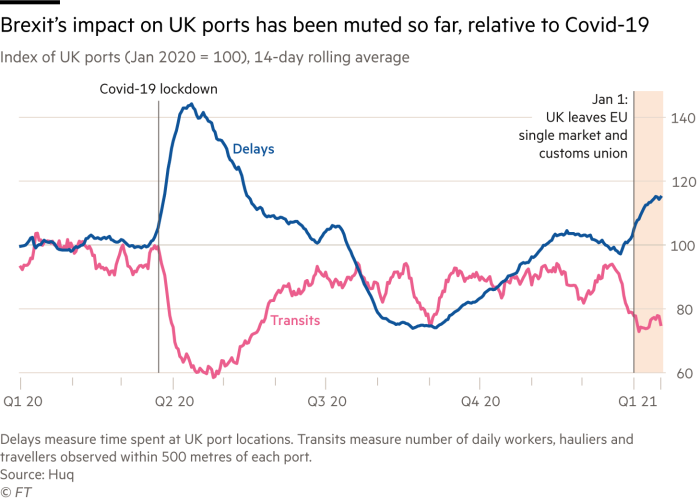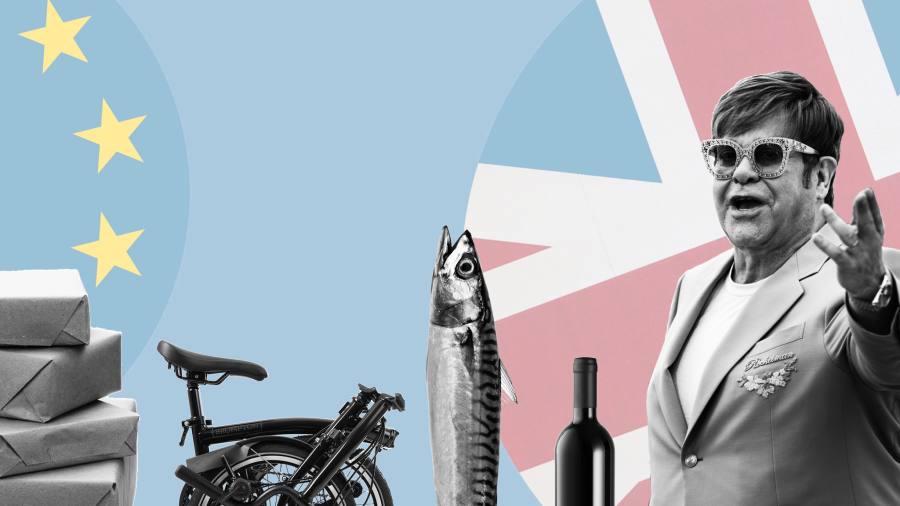[ad_1]
It is now a month since Britain departed the EU single market and customs union, marking a once in a generation shift in the UK’s trading relations with the bloc.
The British government’s worst fears of huge queues of lorries backing up from the English Channel ports, and food shortages in supermarkets, have so far not materialised. But many businesses have warned they are struggling to adjust to the new arrangements resulting from the UK-EU trade deal unveiled on Christmas Eve and implemented on January 1.
Here the Financial Times looks at five different areas of Brexit-related disruption. While some are teething problems, others risk becoming long-term issues unless changes are made.
1. Agriculture and fishing
The farming and fishing industries quickly found themselves at the sharp end of the new trading arrangements since their fresh produce cannot be stockpiled and requires the most onerous EU paperwork reserved for imports of animal and plant origin.
Furious Scottish and Cornish fishermen said they had been “betrayed†by UK prime minister Boris Johnson in the terms he signed up to in the UK-EU trade deal, as they struggled to export their catch to the bloc on a timely basis because of Brexit red tape.
Fishermen who before January 1 could simply load their produce on to lorries for next-day delivery to the EU must now fill in customs declarations, catch documents and export health certificates, among other things.
The British government announced a £23m compensation package for the fishermen, but the long-term impact of new border frictions is unclear.
Donna Fordyce, chief executive of Seafood Scotland, a trade body, said the flow of exports to the EU had improved from a “standstill to a trickleâ€, but huge issues remained.
“There is no clear sign yet of a viable export route to Europe able to cope with anything close to the volumes we should be sending across the water,†she added.

British farmers were also hit, with some of their meat spoiling in EU ports because the bloc’s border officials said the produce had incorrect export health certificates.
The National Sheep Association said new paperwork added up to £1.20 per lamb sent to the EU. “We’ve gone from a relatively 21st-century system back to a 19th-century system,†said Mike Gooding, director at Farmers First, a lamb exports co-operative with about £100m of annual revenues.
UK farmers also complained they were being undercut by cheap EU imports because of the British government’s decision not to impose full border checks on imports from the EU until July.Â
“Our exporters are struggling to export to the EU and at the same time our borders are fairly freely open,†said Nick Allen, chief executive of the British Meat Processors Association.Â
2. Consumers buying EU goods
British consumers buying goods from the EU rapidly discovered that living outside the bloc’s single market has created significant friction and extra costs.
Several major logistics companies, including DHL, DPD and DB Schenker, were forced to suspend cross-border delivery services as they adjusted to new customs paperwork and other bureaucracy.
The services all restarted, but many consumers were surprised when goods were delivered with extra costs, including value added tax on goods worth more than £135, plus other tariffs and handling charges.

Social media was awash with complaints of purchases that came with a sting in the tail, such as Alexander Peschkoff, who ordered €50 worth of electronic goods from Germany and received a bill for £71.93 when the parcel was due for collection.
“When I called the company customer service they couldn’t explain what the charges were for, only that they needed to be paid for the product to be delivered,†he said. “We paid up, as we had no choice.â€
“There is no policy fix for this,†said William Bain, of the British Retail Consortium, a trade body. “This is here to stay.â€
3. Northern Ireland
The new arrangements for Northern Ireland contained in the Brexit withdrawal agreement — a protocol that took effect on January 1 — quickly caused controversy because some supermarkets were left with empty shelves due to product shortages.
J Sainsbury was at one point stocking Spar meat products and Marks and Spencer suspended some products lines after food suppliers encountered delays in shipping goods from Great Britain to Northern Ireland because of Brexit-related red tape.
Northern Irish consumers also complained that the protocol in the withdrawal agreement, which leaves the region following all the rules of the EU customs code, meant that they were no longer able to secure some products from Great Britain, such as plants and seeds.
The protocol is intended to avoid a hard border on the island of Ireland, and requires checks in the Irish Sea on goods sent from Great Britain to Northern Ireland.
Leading members of the pro-UK Democratic Unionist party, the largest group in the Northern Ireland assembly, this month called for the protocol to be suspended because of the negative impact on trade flows.
But Aodhán Connolly, director of the Northern Ireland Retail Consortium, a trade body, said many of the initial problems with supplies and haulage had settled down.
However, he added that the real test would come in April when a three-month grace period on paperwork for animal and plant products expires. “The big test comes in April when volumes go up and new rules come in: we will need maximum flexibility from both sides,†said Mr Connolly.
Supermarkets this month said the Northern Ireland protocol was “unworkable†without a longer grace period and called for talks on a solution between the UK and the EU.
Pressure on the EU to provide greater flexibility on implementation of the protocol increased after the European Commission on Friday moved to suspend it to prevent the export of Covid-19 vaccines made in the bloc to the UK — a decision Brussels quickly rescinded after it provoked anger in London, Belfast and Dublin.
Stephen Kelly, chief executive of Manufacturing Northern Ireland, a trade body that has been helping business adjust to the new trading arrangements, said Brussels’ action had plunged the status of the protocol into the unknown.
“Now is useful time for the UK to press for those much needed . . . easements and flexibilities,†he added. “Certainly, the EU are now in no position to demand a rigorous implementation.â€
4. Small businesses
UK small and medium-sized businesses have struggled most to adapt to the new trading relations with the EU, as bosses questioned whether they could keep selling to customers in the bloc given the sudden imposition of higher costs, including increased courier charges and tariffs.
Many discovered that goods being brought into Britain and then exported to the EU incurred tariffs, making the UK unviable as a trade hub. This has spurred companies to set up distribution warehouses in the EU, at the expense of British jobs.
Samantha Cameron — whose husband David, then prime minister, called the 2016 Brexit referendum — on Thursday told the BBC that her fashion business was finding post-Brexit trading with the EU “challenging and difficultâ€.
Many UK small businesses reported stopping exports to the EU temporarily as they figured out what was required under the new trading arrangements.
Will Butler-Adams, managing director of bike maker Brompton, has halted EU retail exports for January, although he hopes to resume “imminentlyâ€. “If things go a bit squiggly for six months, it’s not the end of the world,†he said.
5. Service industries
Travel restrictions caused by Covid-19 muted the impact of the UK-EU trade deal on professional services, but many industries began to wake up to the reality that they will have to secure visas and work permits to operate in the bloc.
UK pop stars led by Elton John and Sting pressed the British government for help after losing the ability to freely move across the EU.
In a letter to The Times signed by more than 100 UK musicians, they said the government had “shamefully failed†their industry during the trade agreement negotiations.
Like others in UK service industries, including conferences and fashion, British musicians now need work permits for some EU countries — costly for those on a multi-date European tour — while transporting equipment faces additional red tape.Â
Stephen Phipson, head of Make UK, the manufacturers’ trade body, said British companies were worrying about how their service engineers could travel to the EU given the lack of mutual recognition of professional qualifications once the coronavirus lockdown ends.
There were already examples of engineers “being turned away at the borderâ€, he added.Â
[ad_2]
Source link






